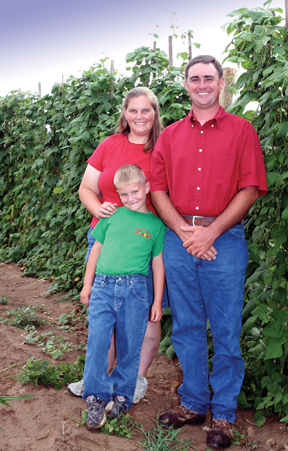OYFF: Vegetable Crops Are Not Just Kid Stuff For The Calvert Family Any More

Jeremy Calvert was one of those kids who never had to be told to eat his vegetables. No, Jeremy Calvert was one of those rare kids who not only ate his vegetables, but grew them too.”At 8 or 10 years old, I had my own garden, and I sold stuff from it even then,” he was saying
Plus, Jeremy, wife Julie and their 5-year-old son, James, are the Alabama Farmers Federation’s Outstanding Young Farm Family in the Horticulture Division. And none of them has any regrets about choosing to farm.”I’ve been fortunate. Farming is all I’ve ever wanted to do,” said Jeremy. “Farming’s been good to me. Can’t complain.”Likewise, Julie, who holds an associate’s degree in child development from nearby Wallace Community College in Hanceville, enjoys being home when she’s not handling the duties at the Walker County Farmers Market in Jasper.”I like it here because I can stay here with my son, and I can be with Jeremy as much as I want to, and if I don’t want to, I can send him to the field,” Julie said with a laugh. “I get to spend more time with them than if I was at a public job. I like being close to the house here.”On market day, she’s up at 4 a.m. and at the market by 5:30. “You try to get it all put out before customers start coming in,” Julie said. “It’s just constantly trying to keep the table filled up and everything out and have a good presentation. That’s important. If the table looks full, people stop. But if the table’s empty, they don’t stop. If you’re getting low on something, you might as well pack it up because they’re not going to stop and buy anything. They just walk right on by you.”It’s one of those lessons in retail marketing that the Calverts have learned on their own.”We’ve built our business on quality product, steady supply and just the fact of being there,” said Jeremy. “There’s not a dime in growing this stuff — you make your living in selling it. If you don’t have a good product that causes people to say, ‘That was good! I want more of that. I didn’t throw any of that away,’ they won’t come back.
“People like to buy stuff they can cook and eat like squash and eggplant,” he added. “But there are very few people who won’t buy a good ripe tomato. And I mean a good ripe tomato — not a sorry ripe tomato, not a fair ripe tomato — a good ripe tomato. There are very few people who won’t eat that. They cut it, they eat it, they throw away what’s left and you’re done. Peaches, same way. Strawberries, same way. That dictates what you raise.”If you want to make a living, you change with the eating habits of the nation and the times or you don’t survive. It’s just that simple.”It’s also a simple fact, both say, that quality makes all the difference in whether customers keep coming back.”We try our best to get the best quality stuff we can,” said Julie. “Our motto is, ‘If you doubt about it being rotten, throw it out.'””I don’t want any ‘doubts’ put on my truck,” Jeremy agreed. “Now, I’ve had to learn to accept that there’s no such thing as ‘perfect’ produce. No matter how hard you try, no matter what you do, sooner or later, something is going to slip through. We’ll have maybe one or two customers a year who come back and say ‘I bought this and it was bad.’ Well, you don’t question it — you just give them another one. If you put it on the table, you better have no doubt about what’s there. It better look good, it better taste good and it better be good. That’s the way we try to operate.”He credits the Buy Fresh Buy Local campaign as being a big boost to business, raising awareness from consumers about fresh produce. Too, the voucher program from the Farmers Market Senior Nutrition Program continues to bring more people to their booth at the market.Now, Jeremy is working on yet another dream — his very own peach orchard.”We’re getting into the peach business,” he said. “I’ve got 392 peach trees ordered. I’ve always wanted a peach orchard, always thought I would like the peach business, and I’ve researched it the last 10 years. I’ve sat beside peach growers in the Birmingham market and talked with them. The only way to know if you can make peaches is to just try it. And I’m going to try it.”In the meantime, there are about 20 acres to double-crop vegetables on, and two, 400-foot broiler houses to keep the Calverts busy.
“We’ve been the top grower out of the last four bunches,” Jeremy says. “The company we grow for has been extremely fair with us. We’ve got good chickens, good feed and good management.”All in all, the Calverts will tell you, it’s a good life.”My wife and I have made a good living doing what we do,” says Jeremy. “I feel like, financially, we’re in better shape than most our age. If the good Lord gives me four more years, I won’t owe a soul. I’ll be completely out of debt. I don’t owe on much that you see — all I owe on is one new tractor down there. It’s been good to us; we can’t complain. We’ve worked hard for it, but I’ve never had a doubt about what I wanted to do. I love what I do, and I take it very seriously.”
